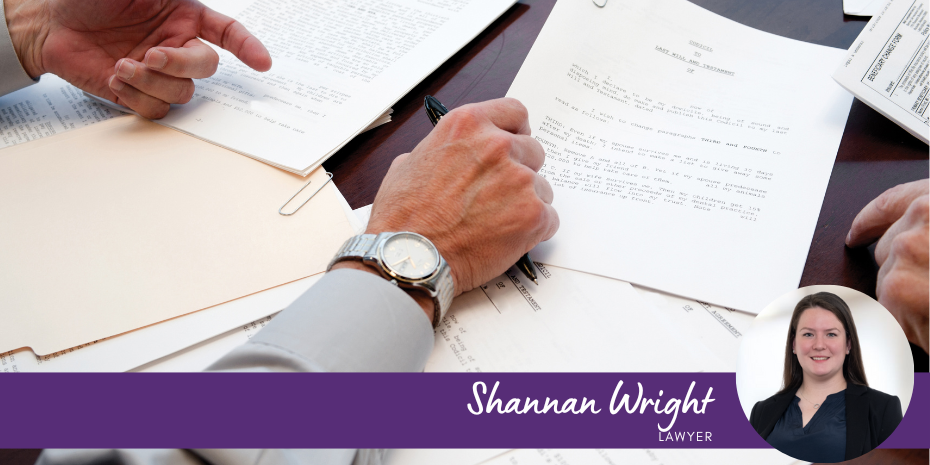KEY TAKE-OUTS:
- A Will is a document that contains the wishes of a deceased person.
- Wills are not registered.
- Wills can be contested.
- Wills are important to ensure a person’s wishes are documented and followed.
How do Wills work?
A Will is a legal document setting out the wishes of a person on their death, namely how and to whom their assets (such as their home, bank accounts, shares and personal items) are to be left.
A Will can leave specific items, such as jewellery or sentimental items, as well as gifts of money to named people.
In addition, or alternatively, a Will can set out the division of a person’s assets between family members, friends or charities in specific shares or percentages.
A child is not able to receive money from a deceased person’s estate until they reach at least 18 years of age. Often however people choose to increase the age that the child will receive their gift to 21 or 25 years or even older.
A Will can create a trust for the child’s money to be managed for them during their childhood. Funds from the trust can be used for the child’s maintenance, education, or benefit. Any monies remaining in the trust will be given to the child on reaching the specified age.
Similarly, a Will can direct that the entitlement of any person under a disability (for example intellectual, mental, drug, alcohol, or gambling addiction) be managed by another person on their behalf.
A Will often also contains directions in relation to whether the person wishes to be buried or cremated.
A Will also names an executor, the person who has the authority to make sure that the Will is followed.
A Will does not come into existence until a person’s death so it can be changed as many times as a person wishes before their death.
No one is entitled to view the Will of another person without their permission.
On the death of a person, the law determines who is allowed to request to view and/or be provided with a copy of a person’s Will which includes, the spouse, the child, the parent of the deceased person, as well as anyone named in the Will, whether they are to receive a benefit or not.
Only the executor however is allowed to request to be provided with the original Will.
Are Wills registered?
There is not currently a public register of Wills in NSW.
The New South Wales Trustee and Guardian offers a secure storage option called Will Safe. Once a person dies, you can make an enquiry with New South Wales Trustee and Guardian to see if they hold a Will for the deceased.
The Probate Registry of the Supreme Court of New South Wales also has a facility for a person to lodge a Will with it.
Most people however keep their Will with the solicitor who prepared it or otherwise keep it at home with their important documents.
Can Wills be contested?
The short answer is yes, a Will can be contested. There must however be grounds for contesting a Will, not simply that a person is disappointed that they were left out of a Will or received less than they hoped to receive.
Wills can be contested on the following grounds:
-
Lack of testamentary capacity
When a person proves that the deceased person did not have the mental capacity to make the Will. That is to say that the Will maker did not:
- Understand that the Will was a document disposing of their assets on death;
- Know what assets and liabilities they had to dispose of;
- Appreciate who was likely to expect to receive provision from their estate;
- Suffer from a disorder of mind affecting their decision making.
-
Lack of knowledge and approval
It is presumed that a person knew and approved of the contents of a Will they signed.
Where it can be proved that the Will was read by or to the person making the Will at the time of signing, it may be more difficult to argue that the person did not know or approve of its contents. If, however, there are suspicious circumstances surrounding the preparation or signing of the Will, these circumstances can cast doubt on the presumption that the person knew and approved of the Will.
-
Undue influence
When a person is pressured by another person to write their Will against their wishes or in a way that does not carry out their true intentions.
The pressure could be extreme such as threats, violence or blackmail but is more likely to be subtle such as lies or flattery.
It often involves a person putting pressure on an elderly or vulnerable person by appearing to pay attention to or care for them, often in the later stages of their life and in return seeking they be included in their Will.
In the case of Wingrove v Wingrove, undue influence was described as “coercion… The testator (will maker) is in such a condition that if he could speak his wishes to the last, he would say, “This is not my wish but I must do it…”
-
Fraud or forgery
When a person proves that the deceased person’s signature on a Will was not that of the deceased person.
A handwriting expert is usually engaged to compare the signature on the Will to other documents signed by the deceased person, particularly shortly prior to the Will signing.
-
Family provision
When an eligible person believes that they have not been provided for sufficiently in the Will and they have a need for more.
Only the following people are classed as “eligible” to bring a claim against a deceased’s estate:
- A husband or wife of the deceased at the time of death;
- A person living with the deceased in a de facto relationship at the time of death;
- A child of the deceased;
- A former spouse of the deceased;
- A person who was at any time dependent on the deceased AND was a grandchild;
- A person who was at any time dependent on the deceased AND was at any time a member of the household of the deceased (for example a stepchild);
- A person with whom the deceased was living in a “close personal relationship”, defined as two adults, one of whom provides the other with personal care and domestic support, not for fee or reward (for example a sibling).
Any eligible person above, (other than a wife/husband, de facto partner or child) must also satisfy the court that having regard for all of the circumstances of their case, there are factors which warrant them making a claim. It is therefore more difficult for eligible persons in those categories to make a claim.
To determine whether an eligible person should receive more from the estate of the deceased, the Court must consider the following matters:
- The nature and duration of the relationship between the deceased and the claimant.
- Any obligations or responsibilities the deceased owed to the claimant.
- The nature and value of the deceased’s person’s estate.
- The financial and personal circumstances and needs of the person making the claim, as well as the financial and personal circumstances and needs of those who are to otherwise inherit the estate.
- The financial circumstances of the claimant’s partner.
- Any disability of the claimant or of those who are to inherit the estate.
- The age of the claimant.
- Any contribution made to the deceased’s estate by the claimant.
- Any gifts made to the claimant by the deceased, either during lifetime or on death.
- Evidence of any statements made by the deceased about their wishes.
- Whether the deceased was supporting the claimant during the deceased’s lifetime.
- If there is any other person who ought to be supporting the claimant.
- The character and conduct of the claimant before and after the deceased’s death.
- The conduct of any other person before or after the death of the deceased.
- Any relevant Aboriginal or Torres Strait Islander customary law.
- Any other matter the court considers relevant.
Why are Wills important?
If a person does not have a Will, the law determines who is to inherit their estate. This law is known as the rules of intestacy and in New South Wales can be found in Chapter 4 Succession Act 2006.
Once applied, the rules of intestacy may result in someone the deceased did not want to benefit on their death, receiving the whole or part of their estate.
By way of illustration, if a wife with no children separated from her husband 10 years ago and did not speak to him again but did not divorce and did not have a Will, the husband would receive the whole of her estate.
Without a Will, people outside of the family bloodline will not receive any benefit from the deceased’s estate, no matter how involved the person has been in the life of the deceased. Common examples of such people who may miss out are close friends or neighbours. Similarly, without a Will, even if a deceased person was actively involved in charities, these charities will not benefit under the rules of intestacy.
How can Coutts Lawyers and Conveyancers help you?
Please contact our friendly Wills and Estates team to make an appointment to assist you to prepare a Will and avoid many potential problems!
For further information please don’t hesitate to contact:
info@couttslegal.com.au
1300 268 887
Contact Coutts Lawyers & Conveyancers today.
This blog is merely general and non-specific information on the subject matter and is not and should not be considered or relied on as legal advice. Coutts is not responsible for any cost, expense, loss or liability whatsoever in relation to this blog, including all or any reliance on this blog or use or application of this blog by you.



